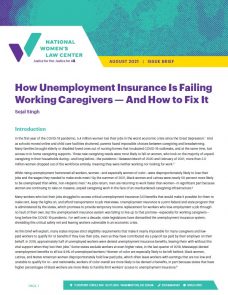Abortion rights, women of color, and LGBTQIA+ people are under attack. Pledge to join us in fighting for gender justice.
 While rising unemployment hammered all workers, women—and especially women of color—were disproportionately likely to lose their jobs and the wages they needed to make ends meet. In the first year of the COVID-19 pandemic, 5.4 million women lost their jobs in the worst economic crisis since the Great Depression and as schools moved online and child care facilities shuttered, parents faced impossible choices between caregiving and breadwinning.
While rising unemployment hammered all workers, women—and especially women of color—were disproportionately likely to lose their jobs and the wages they needed to make ends meet. In the first year of the COVID-19 pandemic, 5.4 million women lost their jobs in the worst economic crisis since the Great Depression and as schools moved online and child care facilities shuttered, parents faced impossible choices between caregiving and breadwinning.
By the summer of 2021, Black women and Latinas were nearly 50 percent more likely to be unemployed than white, non-Hispanic men.5 As jobs return, men are returning to work faster than women—in significant part because women are continuing to take on massive, unpaid caregiving work in the face of an overburdened caregiving infrastructure. Many workers who lost their jobs struggled to access critical unemployment insurance (UI) benefits that would make it possible for them to make rent, keep the lights on, and afford transportation to job interviews. Unemployment insurance is a joint federal and state program that is administered by the states, which promises to provide temporary income replacement for workers who lose employment a job through no fault of their own. But the unemployment insurance system was failing to live up to that promise—especially for working caregivers— long before the COVID-19 pandemic. As this brief will explain, many states impose strict eligibility requirements that make it nearly impossible for many caregivers and low paid workers to qualify for UI benefits if they lose their jobs, even as they have contributed via a payroll tax paid by their employer on their behalf.
In March 2020, as millions of workers were losing their jobs every week, Congress passed the CARES Act, a stimulus bill that included an unprecedented expansion to unemployment insurance.10 The CARES stimulus package authorized a much-needed increase to workers’ (previously unlivable) weekly UI benefit and created a new, federally-funded unemployment insurance program for workers, including many workers with caregiving responsibilities, who could not claim unemployment insurance under state law. The CARES Act programs, and later bills reauthorizing them, were a critical safety net for workers who needed to care for sick loved ones or young children during the pandemic. But these programs are slated to end by September 6, 2021—and we risk losing what critical gains were hard-won during the height of the pandemic, and returning to a status quo in which states left unemployed caregivers with no way to make ends meet.
